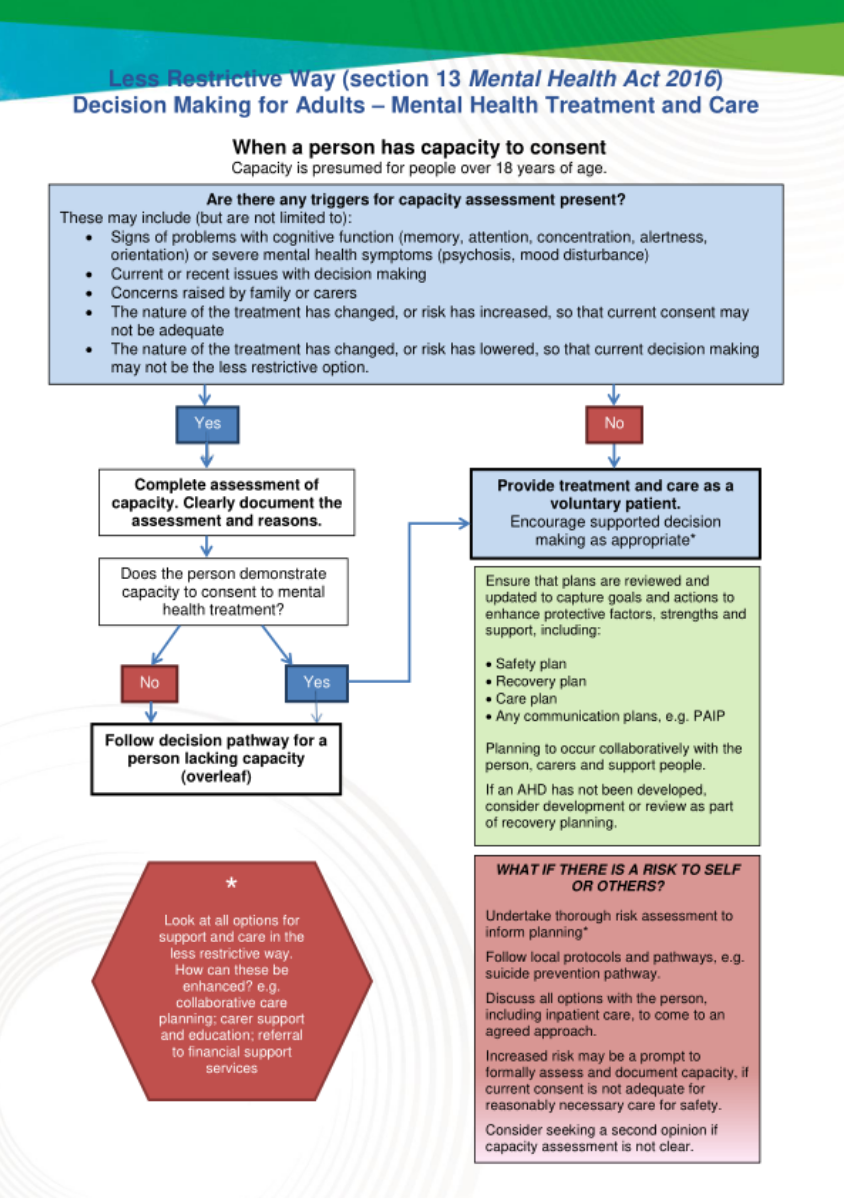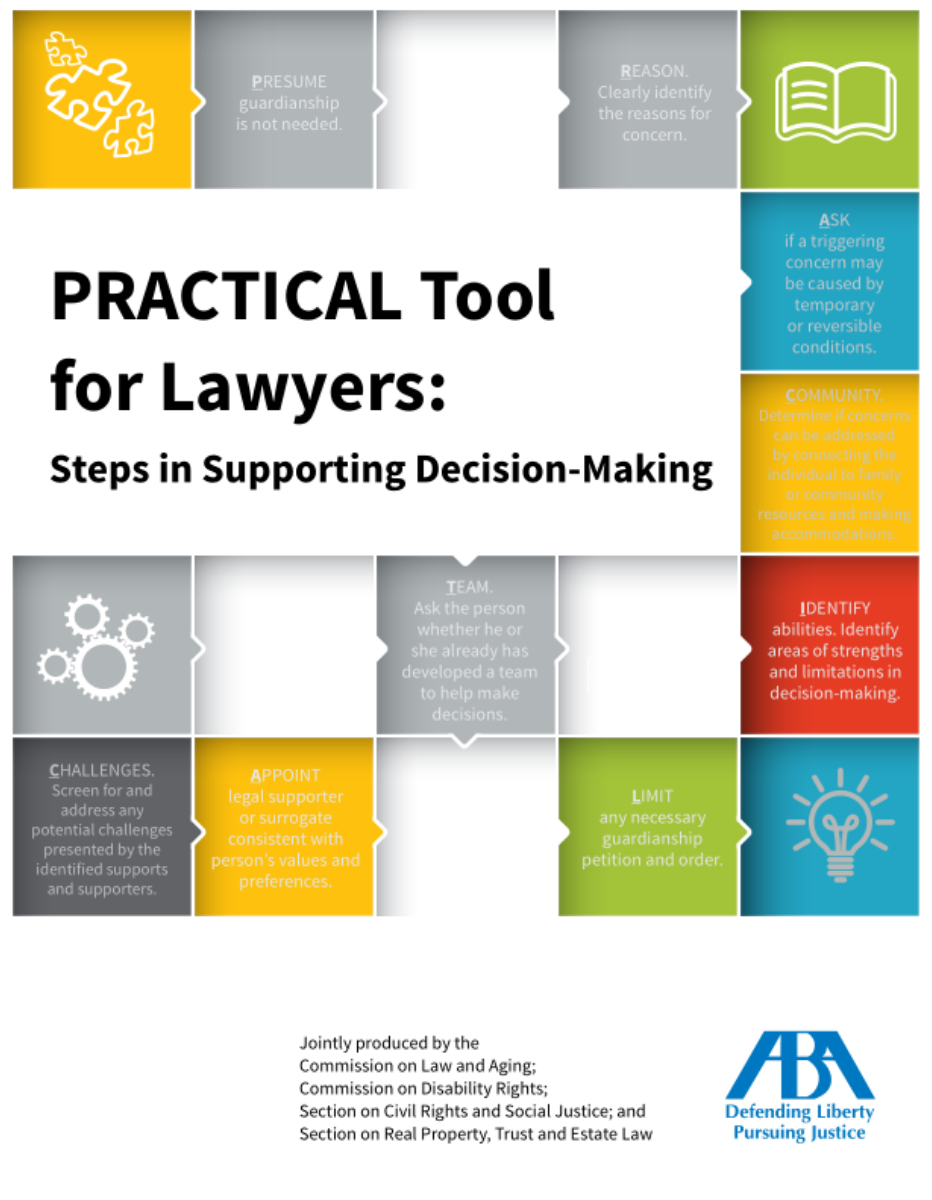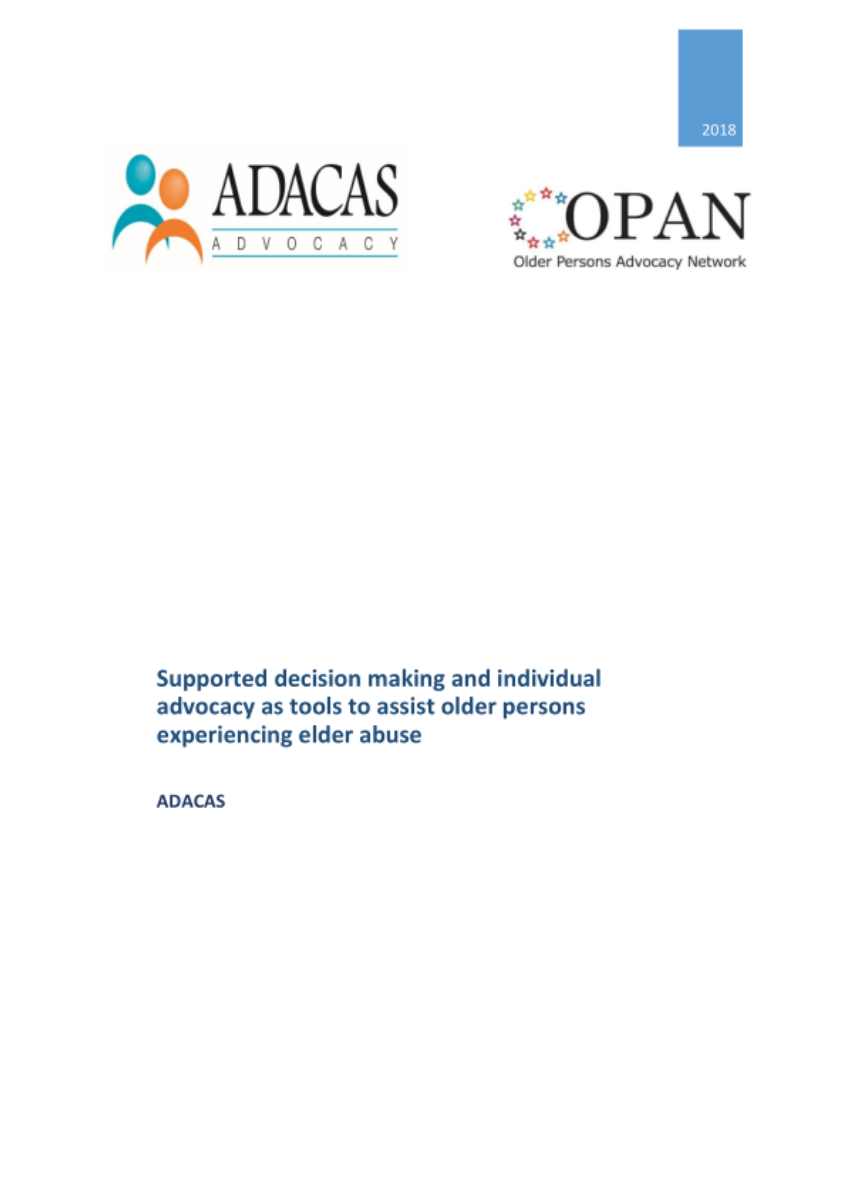Supported Decision Making
Making Decisions with Help from Others (Supported Decision-Making)
Most people seek help from families, friends and professionals when we make major decisions about our lives.Supported decision-making assists people with cognitive impairment to make decisions about their day-to-day lives, such as decisions about their healthcare, housing and finances.
Supported decision-making is the formal and informal support given to people who might have problems making decisions due to a cognitive impairment. Supported decision-making enables people to exercise self-determination and their human rights as citizens.
It has the potential to improve mental health and wellbeing and support recovery.
The laws in Queensland recognise a person’s right to make their own decisions and encourages supported decision-making.
Reference: https://www.qmhc.qld.gov.au/research-review/human-rights-protection/supported-decision-making
Spectrum of Support and the Least Restrictive Way
Supported decision-making requires flexibility in meeting people where they are at, and therefore requires a fluctuating level of input. Therefore, supported decision-making must operate on a spectrum.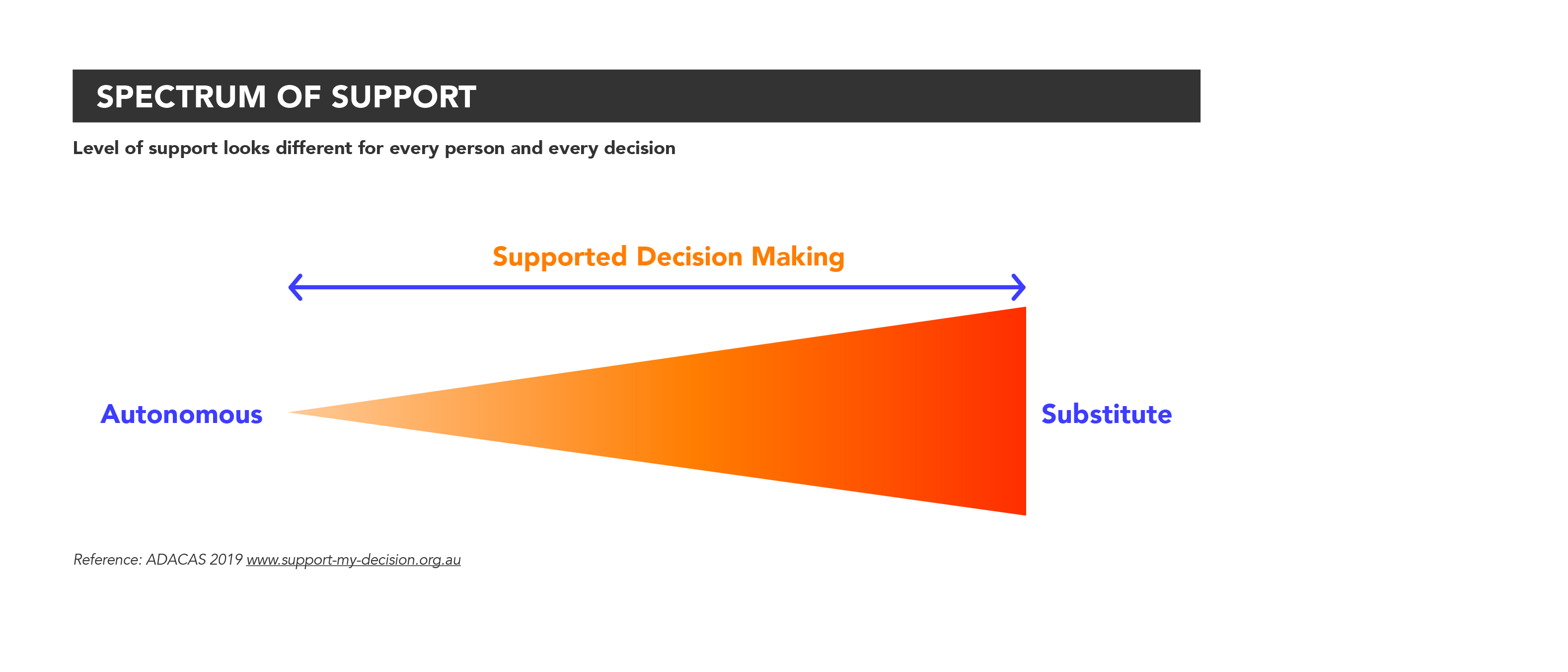
Reference: ADACAS NEAC 2019
Working with others on a fluctuating spectrum empowers the person to be supported in the least restrictive way.
To understand how to make decisions to support people in this way, refer to the Resource section on this page: Least Restrictive Way Flowchart – Queensland Health
Support Networks and Supported Decision Making
Understanding a person’s support network is an important part of knowing how to apply appropriate supported decision-making practices.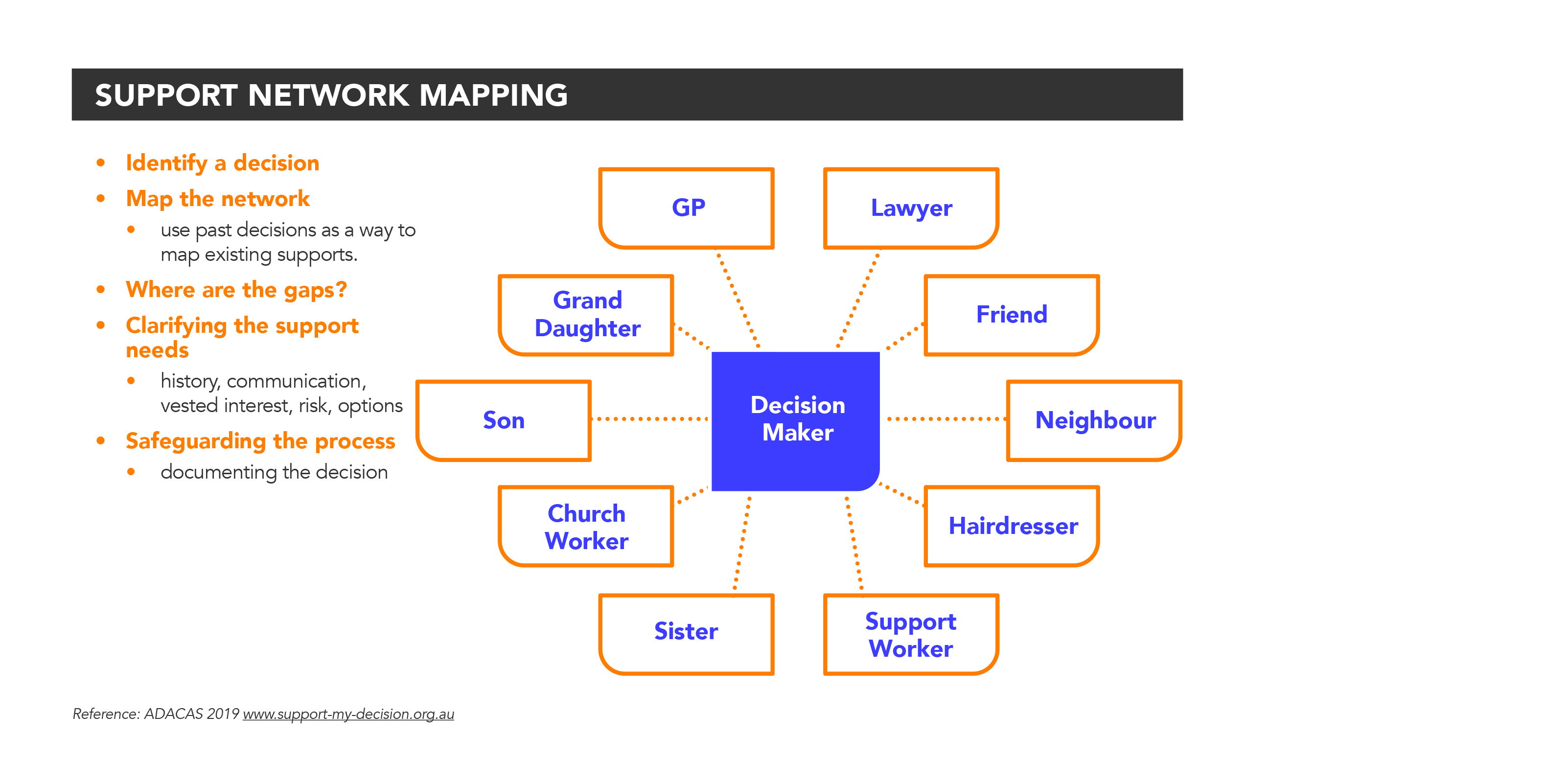 Reference: ADACAS NEAC 2019
Reference: ADACAS NEAC 2019
Rights of family, carers, and other support persons
Qld Health Factsheets and Forms:- Rights of Family, Carers and Other Support Persons and
- Support Persons
- Role of nominated support persons
- Nominated support persons – Guide and form
- Revocation or resignation of appointment of nominated support person Form
Supporting Financial Decisions
The Supporting Financial Decisions videos below help educate people with cognitive impairment or intellectual disability, their supporters and networks about:- The rights of individuals who need support
- The responsibilities of financial supporters
- Real stories of people who have become more financially independent
- How to find services that develop money skills
The Stories
Click on each picture below to watch the video
Claire’s and Michael’s Stories – This video offers real world examples of people living with financial independence despite their intellectual disability. It shows the journey of Claire, Michael, and their supporters on their financial capability journeys.

Jessie’s Story – Jessie’s story portrays a situation where Jessie has her mum as her informal financial supporter, and together, they grow her financial capability.

Li’s Story – In Li’s story, he had the unfortunate experience of being taken advantage of by others financially. A Tribunal then appoints a financial decision maker for Li, and we follow his journey of increased financial capability as he develops his money skills.
The direct You Tube links for the Supporting Financial Decisions videos are below:
- Claire and Michael’s Story – https://www.youtube.com/watch?v=dPQWru2TKRE
- Claire and Michael’s Story (Closed captions) – https://www.youtube.com/watch?v=t8k9PXvSMHQ
- Jessie’s Story – https://www.youtube.com/watch?v=dTjAo8QCc8g
- Jessie’s Story (Closed caption) – https://www.youtube.com/watch?v=0c1MP0c6fs0
- Li’s Story – https://www.youtube.com/watch?v=SRTY1yXDpK4
- Li’s Story (Closed captions) – https://www.youtube.com/watch?v=4SQrC87pVvM
Supported Decision-Making (Office of Public Guardian Policy)
We believe all of our clients can live full lives, often contributing and realising potential that others may never have imagined. Therefore, all our decisions aim to reflect this. We do not believe that a declaration of impaired decision-making capacity by a Tribunal (which may attract the Public Guardian’s appointment) means that an adult cannot meaningfully contribute to decisions made about them.That’s why we operate from a framework of supported decision making for everything we do. This means “the process of assisting a person to make their own decisions, so they can develop and pursue their own goals, make choices about their life and exercise some control over the things that are important to them”. This approach to decision-making attempts to affirm the adult’s right to be in charge of their own life.” (Definition courtesy of NSW Department of Family & Community Services).
Supported Decision-making as an approach to guardianship has its foundation in the United Nations Convention on the Rights of Persons with Disabilities. Its core principles are that:
- Every person can express their will and preference
- A person with disability has the right to make decisions
- A person with disability can expect to have access to appropriate support to make decisions
Structured Decision-Making
Information on the position of the Public Guardian when making decisions as guardian or attorney for adults with impaired capacity. This prioritises and promotes a least restrictive decision-making model within guardianship. View the Structured Decision-Making framework.Reference and for more information go to: https://www.publicguardian.qld.gov.au/guardianship-and-decision-making/restrictive-practices-decision-making/supported-decision-making
Other Supported Decision-Making Resources
- Qld Mental Health Commission – https://www.qmhc.qld.gov.au/
- QAI Position Statement on Supported Decision-Making – https://qai.org.au
- Public Advocate Report 2016 – Decision Making Support and Queensland’s Guardianship System
- Public Guardian Qld – How we make decisions – Supported Decision Making and Policy – Structured Decision Making
- Supported decision making and individual advocacy as tools to assist older persons experiencing elder abuse – ADACAS have created a resource guide to assist you to support older people experiencing abuse. To view this resource, refer to the resource section at the top of this page.
- Practical Tool for lawyers: Steps in Supporting Decision-Making – The American Bar Association Commission on Law and Aging has created a resource to assist lawyers when working with clients with cognitive challenges. To view this resource, go to the resource section at the top of this page.




